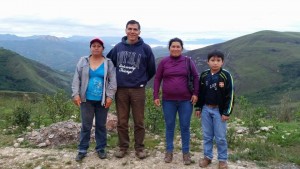Rev. John F. Costello, S.J, Special Assistant to the President, reflects on social justice, faith, and Peru.
In the photo below, note the newly named Jesuit Bishop for Jaen, Peru, an outlying area of especially poor people.
Not only is the good Bishop wearing an LUC sweatshirt, he gives the image of the mission- orientated service model of leadership. He dresses like his flock, embracingly shepherding in the midst of them, and he has a smile reflecting the insistent hope Good News brings.
A zealous adventurer right out of college, I somehow managed to spend those early next four years there in Peru. Without really realizing it at the time, that experience indelibly tattooed on an eagerly receptive and Jesuit educated heart, a treasure worth an Inca’s ransom.
How pithy to discover in later chapters of my life that explicating the aforementioned adventure that fidelity to the Tattoo Artist was all too often described as either Faith and Justice or Social Justice.
That a basic hunger was actually more than satiated in one of the poorest countries in the world, was but the first of many discovered ironies. Ironies are really necessary I think for understanding this, if not most, Gospel satiating phenomenon. The hunger is a universal; it is the same sweet longing Hosea has for his wife; Jeremiah for his Lord of Hosts. Such very favorite authors of the Nazarethan Carpenter shape the more avuncular image of an Author of Life who simply insists on hanging out with the poor and loving them to death so that Hope does indeed spring eternal.
The more I embraced those thus served, the more amazingly palpable the almost overpowering sensations of a very present – and insistently so – Cristo Rey. This rey wore an apron and beckoned by name, come, come to the beach, this grilling fish is for you. Oh my, oh my my my.

